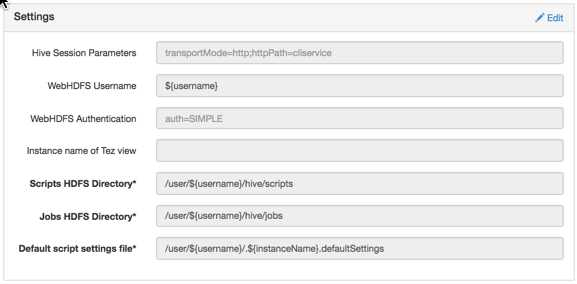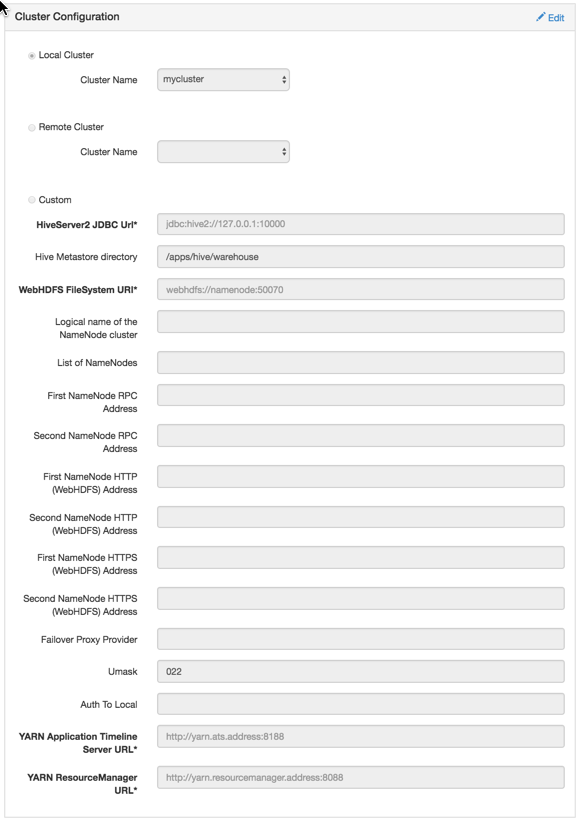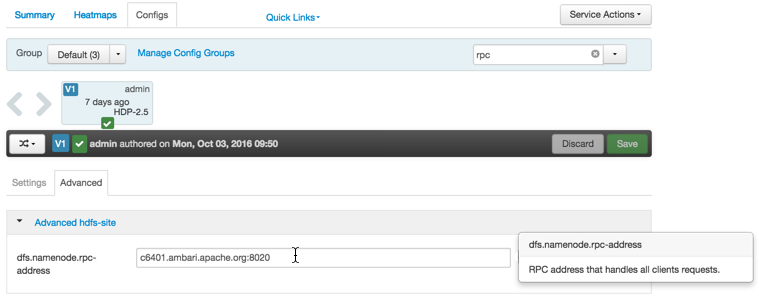3.1. Settings and Cluster Configuration
Ambari configures Hive View settings automatically when you choose to add the Hive service. The default Hive View settings are shown in the following figure:
The default Hive View cluster configuration is shown in the following figure:
If required for migrating view instances, the following table describes how to locate cluster configuration settings using Ambari.
Table 9.2. Finding Cluster Configuration Values for the Hive View using Ambari
|
Property |
Value |
|---|---|
|
HiveServer2 JDBC URL For secured clusters, see Kerberos Setup for Hive Views |
Click Hive > Summary to view the URL, diplayed at the bottom of the Summary list. For example:
|
| Hive Metastore directory | Click Hive > Configs > Advanced > General. For
example, /apps/hive/warehouse |
| WebHDFS FileSystem URI* | Click HDFS > Configs > Advanced >Advanced
hdfs-site For example
dfs.nameserviceid.http-address |
|
For HA: Click HDFS >
Configs > Advanced > Advanced hdfs-site > dfs.nameservice.id. When
you enter the value in the view definition, pre-pend "webhdfs://" to the value you
find in the advanced HDFS configuration settings. For example,
| |
|
Logical Name of the NameNode cluster | |
|
List of NameNodes | |
|
First NameNode RPC Address |
Click HDFS > Configs > Advanced > Advanced hdfs-site > dfs.namenode.rpc-address. See the first address in the list. For example,
|
|
Second NameNode RPC Address |
Click HDFS > Configs > Advanced > Advanced hdfs-site > dfs.namenode.rpc-address. See the second address in the list. For example,
|
|
First NameNode HTTP (WebHDFS) Address |
Click HDFS > Configs > Advanced > Advanced hdfs-site > dfs.namenode.http-address See the first address in the list. For example, |
|
Second NameNode HTTP (WebHDFS) Address |
Click HDFS > Configs > Advanced > Advanced hdfs-site > dfs.namenode.http-address See the second address in the list. For example, |
|
First NameNode HTTPS (WebHDFS) Address |
Click HDFS > Configs > Advanced > Advanced hdfs-site > dfs.namenode.https-address See the first address in the list. For example, |
|
Second NameNode HTTPS (WebHDFS) Address |
Click HDFS > Configs > Advanced > Advanced hdfs-site > dfs.namenode.https-address See the second address in the list. For example, |
|
Failover Proxy Provider |
Click HDFS > Configs > Advanced > Advanced hdfs-site > dfs.client.failover.proxy.provider[nameservice] |
|
Umask |
Click HDFS > Configs > Advanced > Advanced hdfs-site > fs.permissions.umask-mode The default value is 022. Do not change this value unless you are sure that you understand the effects of changing the value on your Hive View cluster. The umask property defines the file mode creation mask, which controls how file permissions are configured in new files. |
| Auth To Local |
Click HDFS > Configs > Advanced > Advanced core-site > hadoop.security.auth_to_local |
|
YARN Application Timeline Server URL* |
Click YARN > Configs > Advanced > Application Timeline
Server > yarn.timeline-service.webapp.address. When you enter the
value in the view definition, pre-pend "http://" to the value you find in the YARN
advanced configuration settings. For example,
|
|
YARN ResourceManager URL* |
Click YARN > Configs > Advanced > Advanced yarn-site >
yarn.resourcemanager.webapp.address. When you enter the value in the
view definition, pre-pend "http://" to the value you find in the YARN advanced
configuration settings. For example,
|
Table 9.3. Cluster Configuration Values for the Hive View 1.5
|
Property |
Value |
|---|---|
|
Hive Session Parameters For secured clusters, see Kerberos Setup for Hive Views |
Not required to be populated. If populated, use the following as an example,
|
|
WebHDFS Username |
$(username) |
|
Scripts HDFS Directory* |
/user/${username}/hive/scripts |
| Jobs HDFS Directory* | /user/${username}/hive/jobs |
| Default script settings file* | /user/${username}/.${instanceName}.defaultSettings |
| HiveServer2 JDBC URL* | jdbc:hive://<host of the machine running hiveserver2>:10000 |
| WebHDFS FileSystem URI* |
WebHDFS FileSystem URI* Click HDFS > Configs > Advanced > Advanced hdfs-site > dfs.nameserviceid.http-address. FOR HA: Click HDFS > Configs > Advanced > Advanced hdfs-site > dfs.nameservice.id. When you enter the value in the view definition, pre-pend "webhdfs://" to the value you find in the advanced HDFS configuration settings. For example, webhdfs://c6401.ambari.apache.org:50070 or webhdfs://nameserviceid |
| YARN Application Timeline Server URL* | Click YARN > Configs > Advanced > Application Timeline Server > yarn.timeline-service.webapp.address. When you enter the value in the view definition, pre-pend "http://" to the value you find in the YARN advanced configuration settings. For example, http://c6401.ambari.apache.org:8188 |
| YARN ResourceManager URL* | Click YARN > Configs > Advanced > Advanced yarn-site > yarn.resourcemanager.webapp.address. When you enter the value in the view definition, pre-pend "http://" to the value you find in the YARN advanced configuration settings. For example, http://c6401.ambari.apache.org:8088 |
For NameNode High Availability
The following values must be entered for primary and secondary NameNodes:
Table 9.4. Hive View Settings for NameNode High Availability
Property | Value |
|---|---|
First NameNode RPC Address or Second NameNode RPC Address | Select the primary or secondary NameNode to view settings from that host in the cluster. See
how to get the NameNode RPC
address. When you enter the value in the view definition, pre-pend
"http://" to the value you find in the advanced |
First NameNode HTTP (WebHDFS) Address or Second NameNode HTTP (WebHDFS) Address | Click HDFS > Configs > Advanced > Advanced hdfs-site >
dfs.namenode.http-address. When you enter the value in the view
definition, pre-pend "http://" to the value you find in the advanced
|
To get First NameNode RPC Address values:
Navigate to the HDFS service page in Ambari that contains links to individual NameNodes. Click NameNode (primary) or SNameNode (secondary) to view the host page:
On the host page, click Configs > Advanced.
Enter "rpc" in the Filter search well at the top right corner of the page or navigate to the Advanced hdfs-site settings to find the
dfs.namenode.rpc-addressvalue that you can enter into the Hive View definition. Here is an example of using the Filter to locate a value:





